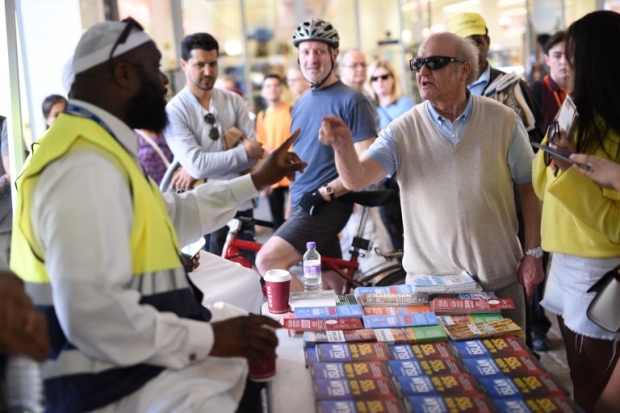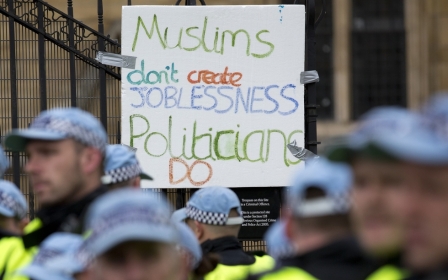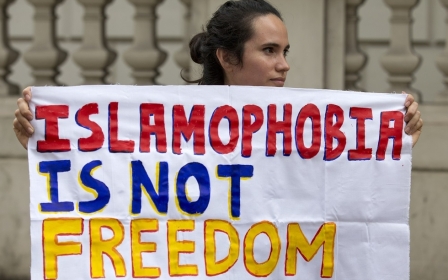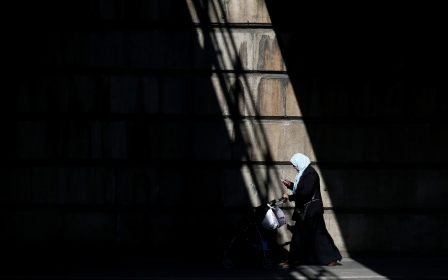#LoveAMuslimDay: A textbook example of how to defeat terrorism
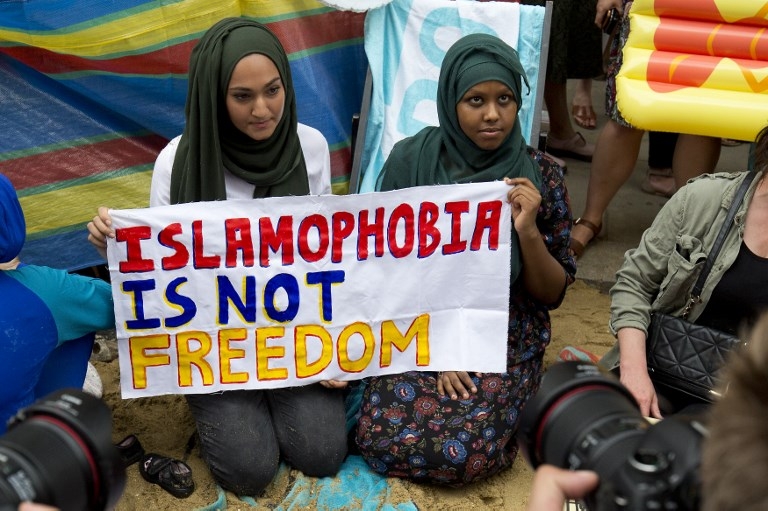
During the course of the 16-year "War on Terror", Western governments have gotten almost nothing right. Their reactionary, draconian, and often self-defeating measures have served only to create more of the very thing they hope to defeat: "Islamic" terrorism.
Infiltrating mosques, expanding surveillance of Muslim communities, implementing community-based counter-radicalisation programs - which turn schoolteachers and social workers into government spies - and pursuing counter-terrorism policies that depend almost exclusively on the use of violence have done nothing to produce a light-bulb moment.
Anti-Muslim hate crimes
Tuesday 3 April 2018 was marked infamously as “Punish a Muslim Day”, thanks to a prank started by a bunch of white ultranationalist idiots in the United Kingdom, who distributed a letter to families throughout East London and a half-dozen other communities.
The letter included a point system for acts of violence carried out against British Muslims, including 25 points for pulling off a woman’s headscarf, 500 points for murdering a Muslim, and 1,000 points for bombing a mosque.
Needless to say, 2.7 million British Muslims had braced for the worst, especially given that a record 1,678 anti-Muslim hate crimes were reported in London in 2017, representing a 40 percent increase from the previous year.
There are many reasons why people are attracted by the ISIS propaganda and fascinated about becoming a foreign fighter ... I think that the most important factor is the lack of identity within communities in the UK
- Shahid Butt, a former foreign fighter
"The truth of the matter is it's always been 'Punish a Muslim Day' for Muslim women," noted spoken word artist Asma Elbadawi.
Hundreds of tweets from concerned Muslims captured the genuine fear felt by so many. "Everyone I know is worried about tomorrow. Muslim women in particular, our mothers and grandmothers, our neighbours and friends, our colleagues and acquaintances," tweeted Samayya Afzal.
Another Twitter user under the name @AsadJKhan2 posted: "Sad state of affairs when I am getting messages from family and friends saying they are going to change their plans to avoid going out in public places due this idiotic #PunishAMuslimDay, I will be more vigilant but am keen to go out and carry on as normal."
‘Turn it into something lovely’
Thankfully, the worst didn't happen. Not a single anti-Muslim hate crime was recorded in a city that experienced, on average, more than four attacks every single day in 2017.
Communities and inter-faith groups rallied around the online hashtag #LoveAMuslimDay, which originated with a counter-letter distributed by the UK based anti-Islamophobia charity Muslim Engagement and Development (MEND), awarding points for smiling at a Muslim, buying a Muslim a cup of coffee, inviting a Muslim into your home, or making a donation towards groups that provide humanitarian aid to the most vulnerable in Yemen, Palestine, Kashmir, Syria, Libya, Iraq and Myanmar.
"I thought, let's turn this letter on its head, keep the points system and turn it into something lovely," said Shahab Adris, a regional manager for MEND. "Some of the responses I've seen from the Muslim community have been really positive, but the most remarkable thing has been getting responses from people who are not Muslim, saying they will do something with a Muslim colleague."
While there were any number of courageous and heartwarming acts of empathy and solidarity last Tuesday, the sight of more than 100 people forming a human chain outside a mosque in Newcastle to fight against racism and Islamophobia was surely among the best.
When you click on the respective hashtags #LoveAMuslimDay, #ProtectAMuslimDay, or even #PunishAMuslimDay, you mostly find expressions of solidarity from non-Muslims to members of the British Muslim community.
From a broader perspective, however, the outpouring of empathy and expressions of solidarity by non-Muslims towards British Muslims is a textbook example of how to defeat so-called “Islamic” extremism or terrorism.
The lure for foreign fighters
According to Shahid Butt, a former jihadist who fought in Kosovo, Afghanistan and Yemen, inclusion is the only way to stop radicalisation in Britain. In a recent interview with The New Arab, he said: "There are many reasons why people are attracted by the Islamic State (IS) propaganda and fascinated about becoming a foreign fighter. Unemployment, hopelessness, rootlessness are all part of the issues; however, I think that the most important factor is the lack of identity within communities in the UK. These men and women feel, as with what happened to me, as if they don't belong to any culture - and the jihadist propaganda fills this void because they spoke to their needs. Of course, a lack of any basic religious knowledge is another very important factor."
To that end, the respective Paris, Brussels, Orlando and Nice attackers were not radicalised on foreign battlefields. They were radicalised at home – in France, Belgium and the United States. Moreover, not one of them came from highly religious backgrounds; all were the "bitter fruits of alienation".
A recent and critical study into radicalisation by IS experts Will McCants and Chris Meserole of the Brookings Institute bears out exactly how important integrating and including Muslims in Western societies is to defeating the current terror threat.
Using data compiled on every known foreign fighter who travelled to Syria during the period 2011-14, along with analytics about the countries they travelled from, the study’s authors found that hyper-secular laws that are politically designed to marginalise or "otherise" Muslims serve only to create instant terrorists.
"What we think matters most here is not the bill or law itself, but the political discourse around it – particularly the way it heightens, for a time, popular conceptions that it is not possible to have both a Western or secular nationalist identity, and also a Muslim one," Meserole said.
The role of social media
In addition, the forces of globalisation, including modern means of communication and transport, are shrinking the distance between the unfamiliar other and ourselves, instilling within our societies a sense of "physical or symbolic threat" and, in turn, producing newly formed social anxieties.
Social media serves to amplify and accentuate discourses that demonise the foreign or external other; it is thus no coincidence that Facebook has been blamed for fuelling the Rohingya Muslim genocide in Myanmar and the recent anti-Muslim mob violence in Sri Lanka and India.
The organisers of "Punish a Muslim Day" were hoping to leverage social media to amplify and mobilise anti-Muslim hate, but instead, non-Muslim Facebook and Twitter users drowned them out with messages of inclusion and solidarity.
"These messages seek to cause fear and mistrust amongst our communities and to divide us," said a spokesperson for the Metropolitan police in London. "Yet in spite of this, our communities have shown strength in their response to such hatred and in their support for each other."
Right there is the blueprint for defeating terrorism. Let's hope those responsible for counterterrorism policy are paying attention.
- CJ Werleman is an opinion writer for Salon, Alternet, and the author of Crucifying America, and God Hates You. Hate Him Back. Follow him on Twitter: @cjwerleman
The views expressed in this article belong to the author and do not necessarily reflect the editorial policy of Middle East Eye.
Photo: Protesters hold a sign reading “Islamophobia is not Freedom” at a protest in London to show solidarity with Muslim women in August 2016 (AFP)
New MEE newsletter: Jerusalem Dispatch
Sign up to get the latest insights and analysis on Israel-Palestine, alongside Turkey Unpacked and other MEE newsletters
Middle East Eye delivers independent and unrivalled coverage and analysis of the Middle East, North Africa and beyond. To learn more about republishing this content and the associated fees, please fill out this form. More about MEE can be found here.



